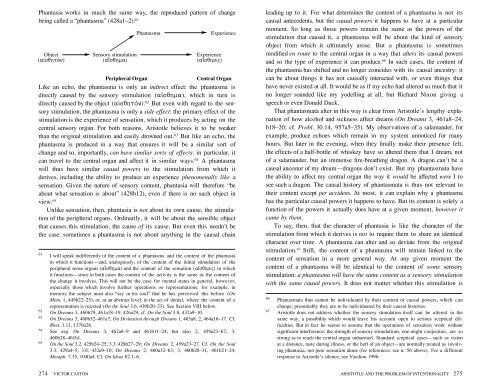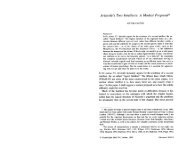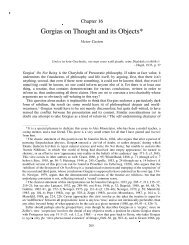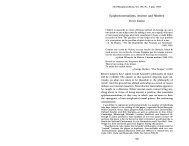Aristotle and the Problem of Intentionality. - Ancient Philosophy ...
Aristotle and the Problem of Intentionality. - Ancient Philosophy ...
Aristotle and the Problem of Intentionality. - Ancient Philosophy ...
You also want an ePaper? Increase the reach of your titles
YUMPU automatically turns print PDFs into web optimized ePapers that Google loves.
Phantasia works in much <strong>the</strong> same way, <strong>the</strong> reproduced pattern <strong>of</strong> changebeing called a “phantasma” (428a1–2): 61Object(afisyhtÒn)Sensory stimulation(a‡syhma)PhantasmaExperience(a‡syhsiw)ExperiencePeripheral OrganCentral OrganLike an echo, <strong>the</strong> phantasma is only an indirect effect: <strong>the</strong> phantasma isdirectly caused by <strong>the</strong> sensory stimulation (a‡syhma), which in turn isdirectly caused by <strong>the</strong> object (afisyhtÒn). 62 But even with regard to <strong>the</strong> sensorystimulation, <strong>the</strong> phantasma is only a side effect: <strong>the</strong> primary effect <strong>of</strong> <strong>the</strong>stimulation is <strong>the</strong> experience <strong>of</strong> sensation, which it produces by acting on <strong>the</strong>central sensory organ. For both reasons, <strong>Aristotle</strong> believes it to be weakerthan <strong>the</strong> original stimulation <strong>and</strong> easily drowned out. 63 But like an echo, <strong>the</strong>phantasma is produced in a way that ensures it will be a similar sort <strong>of</strong>change <strong>and</strong> so, importantly, can have similar sorts <strong>of</strong> effects: in particular, itcan travel to <strong>the</strong> central organ <strong>and</strong> affect it in similar ways. 64 A phantasmawill thus have similar causal powers to <strong>the</strong> stimulation from which itderives, including <strong>the</strong> ability to produce an experience phenomenally like asensation. Given <strong>the</strong> nature <strong>of</strong> sensory content, phantasia will <strong>the</strong>refore “beabout what sensation is about” (428b12), even if <strong>the</strong>re is no such object inview. 65Unlike sensation, <strong>the</strong>n, phantasia is not about its own cause, <strong>the</strong> stimulation<strong>of</strong> <strong>the</strong> peripheral organs. Ordinarily, it will be about <strong>the</strong> sensible objectthat causes this stimulation, <strong>the</strong> cause <strong>of</strong> its cause. But even this needn’t be<strong>the</strong> case: sometimes a phantasma is not about anything in <strong>the</strong> causal chain61 I will speak indifferently <strong>of</strong> <strong>the</strong> content <strong>of</strong> a phantasma <strong>and</strong> <strong>the</strong> content <strong>of</strong> <strong>the</strong> phantasiain which it functions—<strong>and</strong>, analogously, <strong>of</strong> <strong>the</strong> content <strong>of</strong> <strong>the</strong> initial stimulation <strong>of</strong> <strong>the</strong>peripheral sense organs (a‡syhma) <strong>and</strong> <strong>the</strong> content <strong>of</strong> <strong>the</strong> sensation (a‡syhsiw) in whichit functions—since in both cases <strong>the</strong> content <strong>of</strong> <strong>the</strong> activity is <strong>the</strong> same as <strong>the</strong> content <strong>of</strong><strong>the</strong> change it involves. This will not be <strong>the</strong> case for mental states in general, however,especially those which involve fur<strong>the</strong>r operations on representations: for example, inmemory <strong>the</strong> subject must also “say in his soul” that he has perceived this before (OnMem. 1, 449b22–25); or, at an abstract level, in <strong>the</strong> act <strong>of</strong> denial, where <strong>the</strong> content <strong>of</strong> arepresentation is rejected (On <strong>the</strong> Soul 3.6, 430b20–23). See Section VIII below.62 On Dreams 3, 460b29, 461a18–19, 426a29; cf. On <strong>the</strong> Soul 3.8, 432a9–10.63 On Dreams 3, 460b32–461a7; On Divination through Dreams 1, 463a8; 2, 464a16–17. Cf.Rhet. 1.11, 1370a28.64 See esp. On Dreams 3, 462a8–9 <strong>and</strong> 461b11–24; but also 2, 459a23–b7; 3,460b28–461b1.65 On <strong>the</strong> Soul 3.2, 425b24–25; 3.3, 428b27–29; On Dreams 2, 459a23–27. Cf. On <strong>the</strong> Soul3.3, 429a4–5; 3.8, 432a9–10; On Dreams 2, 460a32–b3; 3, 460b28–31, 461b21–24;Metaph. 7.15, 1040a4. Cf. On Ideas 82.1–6.leading up to it. For what determines <strong>the</strong> content <strong>of</strong> a phantasma is not itscausal antecedents, but <strong>the</strong> causal powers it happens to have at a particularmoment. So long as those powers remain <strong>the</strong> same as <strong>the</strong> powers <strong>of</strong> <strong>the</strong>stimulation that caused it, a phantasma will be about <strong>the</strong> kind <strong>of</strong> sensoryobject from which it ultimately arose. But a phantasma is sometimesmodified en route to <strong>the</strong> central organ in a way that alters its causal powers<strong>and</strong> so <strong>the</strong> type <strong>of</strong> experience it can produce. 66 In such cases, <strong>the</strong> content <strong>of</strong><strong>the</strong> phantasma has shifted <strong>and</strong> no longer coincides with its causal ancestry: itcan be about things it has not causally interacted with, or even things thathave never existed at all. It would be as if my echo had altered so much that itno longer sounded like my yodelling at all, but Richard Nixon giving aspeech or even Donald Duck.That phantasmata alter in this way is clear from <strong>Aristotle</strong>’s lengthy explanation<strong>of</strong> how alcohol <strong>and</strong> sickness affect dreams (On Dreams 3, 461a8–24,b18–20; cf. Probl. 30.14, 957a5–35). My observations <strong>of</strong> a salam<strong>and</strong>er, forexample, produce echoes which remain in my system unnoticed for manyhours. But later in <strong>the</strong> evening, when <strong>the</strong>y finally make <strong>the</strong>ir presence felt,<strong>the</strong> effects <strong>of</strong> a half-bottle <strong>of</strong> whiskey have so altered <strong>the</strong>m that I dream, not<strong>of</strong> a salam<strong>and</strong>er, but an immense fire-breathing dragon. A dragon can’t be acausal ancestor <strong>of</strong> my dream—dragons don’t exist. But my phantasmata have<strong>the</strong> ability to affect my central organ <strong>the</strong> way it would be affected were I tosee such a dragon. The causal history <strong>of</strong> phantasmata is thus not relevant to<strong>the</strong>ir content except per accidens. At most, it can explain why a phantasmahas <strong>the</strong> particular causal powers it happens to have. But its content is solely afunction <strong>of</strong> <strong>the</strong> powers it actually does have at a given moment, however itcame by <strong>the</strong>m.To say, <strong>the</strong>n, that <strong>the</strong> character <strong>of</strong> phantasia is like <strong>the</strong> character <strong>of</strong> <strong>the</strong>stimulation from which it derives is not to require <strong>the</strong>m to share an identicalcharacter over time. A phantasma can alter <strong>and</strong> so deviate from <strong>the</strong> originalstimulation. 67 Still, <strong>the</strong> content <strong>of</strong> a phantasma will remain linked to <strong>the</strong>content <strong>of</strong> sensation in a more general way. At any given moment <strong>the</strong>content <strong>of</strong> a phantasma will be identical to <strong>the</strong> content <strong>of</strong> some sensorystimulation: a phantasma will have <strong>the</strong> same content as a sensory stimulationwith <strong>the</strong> same causal powers. It does not matter whe<strong>the</strong>r this stimulation is66 Phantasmata thus cannot be individuated by <strong>the</strong>ir content or causal powers, which canchange; presumably <strong>the</strong>y are to be individuated by <strong>the</strong>ir causal histories.67 <strong>Aristotle</strong> does not address whe<strong>the</strong>r <strong>the</strong> sensory stimulation itself can be altered in <strong>the</strong>same way, a possibility which would leave his account open to serious sceptical difficulties.But in fact he seems to assume that <strong>the</strong> operations <strong>of</strong> sensation work withoutsignificant interference: <strong>the</strong> strength <strong>of</strong> sensory stimulations, one might conjecture, are sostrong as to reach <strong>the</strong> central organ unharmed. St<strong>and</strong>ard sceptical cases—such as visionat a distance, taste during illness, or <strong>the</strong> heft <strong>of</strong> an object—are normally treated as involvingphantasia, not pure sensation alone (for references, see n. 56 above). For a differentresponse to <strong>Aristotle</strong>’s silence, see Vasiliou 1996.274 VICTOR CASTONARISTOTLE AND THE PROBLEM OF INTENTIONALITY 275





